Understanding Cockatiel Food Pellets for Optimal Health
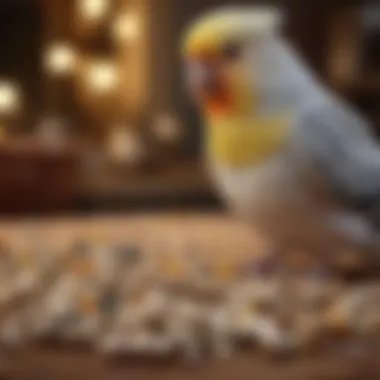
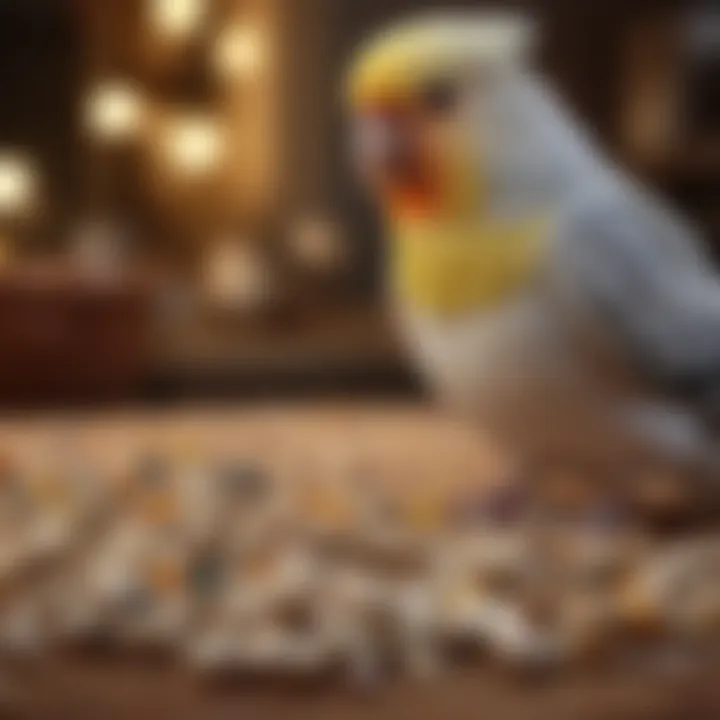
Intro
Cockatiels are popular pets cherished for their lively personalities and vocal abilities. A significant aspect of their care involves understanding the role of nutrition. The shift towards food pellets presents a compelling alternative to traditional seed diets. This guide aims to elucidate the importance of food pellets in ensuring the health and well-being of cockatiels. It highlights not only the nutritional benefits but also the practical considerations in selecting and transitioning to pellets.
Understanding Your Pet
Cockatiels have specific needs that are crucial for their overall health. Understanding these behaviors can significantly impact their diet choices.
Pet Behavior Basics
Cockatiels are social creatures, often exhibiting behaviors influenced by their environments. They thrive on interaction and can become stressed with inadequate stimulation. Observing feeding patterns can provide insights into their preferences. Notably, cockatiels might be reluctant to accept new food items, illustrating the need for gradual changes in their diet.
Common Breed Characteristics
While all cockatiels share general traits, individual characteristics may vary. Some cockatiels may exhibit a fondness for particular colors or shapes in their food. This preference can affect their acceptance of pellets versus seeds. Knowing these characteristics can assist in effectively transitioning them to a pellet-based diet.
Species-Specific Needs
As a species, cockatiels require a balanced diet rich in essential vitamins and minerals. Pellets are formulated to meet these needs comprehensively. Understanding individual dietary requirements helps in selecting the right pellets, thus supporting their health more effectively than seeds, which may lack sufficient nutritional value.
Pet Care and Maintenance
Basic care routines are foundational for cockatiel ownership. A focus on diet is a central pillar of this care.
Feeding Guidelines
Proper feeding is essential for cockatiels. A diet consisting exclusively of pellets is not always advisable initially. Instead, integrating pellets with some seeds can provide a balance that encourages acceptance. The general recommendation suggests that 70-80% of their diet should come from pellets, gradually reducing seed intake.
Grooming Essentials
Though diet might dominate discussions on care, grooming also plays a role. Regularly checking feathers and beak health can prevent issues that may interfere with feeding. A well-groomed cockatiel is likely to exhibit better eating habits, as discomfort can lead to decreased food intake.
Hygiene Practices
Maintaining a clean feeding area is critical. Regularly cleaning food containers can prevent bacteria growth. Cockatiels are naturally curious and will investigate their surroundings. An unclean environment can introduce health risks through contaminated foods.
Training and Development
Training cockatiels not only enhances their relationships with owners but can also introduce new feeding techniques.
Basic Commands and Skills
Teaching basic commands aids in establishing routines that can facilitate feeding times. Associating food with positive reinforcement can encourage pelleted diets, making the transition smoother.
Behavioral Training Techniques
Positive reinforcement through treats (even seeds) can be effective in training. Engaging them with fun tricks can create a bond, making them less resistant to dietary changes. Using a gentle approach is key.
Addressing Common Behavior Issues
If a cockatiel refuses to adapt to new food, it can be rooted in behavioral concerns rather than taste. Identifying triggers such as stress or anxiety will help in creating a more conducive environment for dietary change.
Health and Wellness
Routine checks and maintenance of their health significantly influence how cockatiels respond to their diet.
Routine Vet Check-ups
Regular veterinary visits help monitor overall health. Your vet can provide personalized feeding advice based on your cockatiel's unique health status.
Vaccination Needs
Vaccinations protect against common avian diseases. A healthy bird is more likely to adapt to a new dietary regimen without significant disruptions.
Recognizing Signs of Illness
Being aware of changes in behavior or signs of illness is essential. Loss of appetite or changes in droppings can indicate health issues. Early intervention is crucial for maintaining a balanced diet.
Enrichment and Activities
Integrating activities into your cockatiel’s daily life can complement their dietary habits, promoting better eating behaviors.
Indoor vs. Outdoor Activities

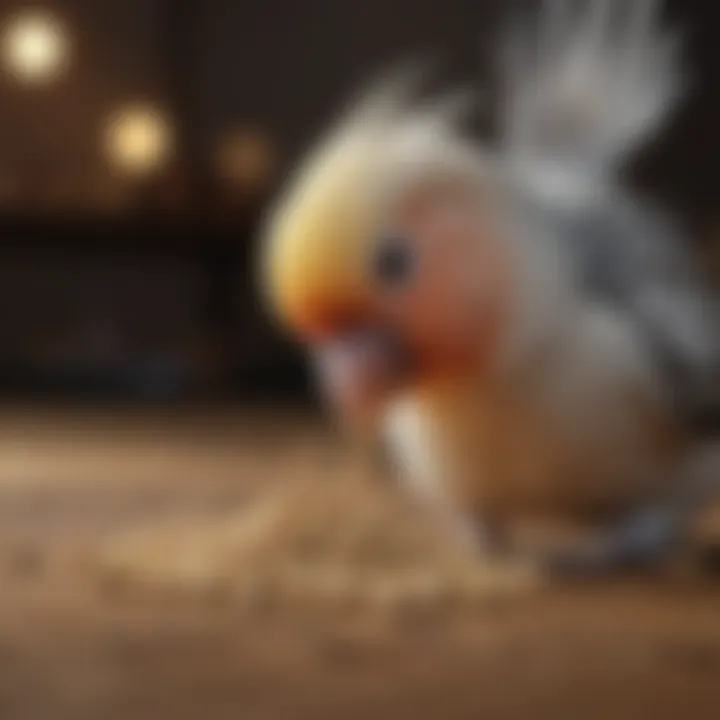
Regular activities, whether indoors or in safe outdoor spaces, challenge cockatiels mentally and physically. This stimulation can enhance appetite and aid in the acceptance of new foods.
Interactive Toys and Games
Using toys that promote foraging encourages natural behaviors. This mimicry of searching for food may increase interest in pellets.
Socialization Opportunities
Socializing cockatiels with other birds or humans can lead to enhanced confidence, making them more open to dietary changes. Encouraging group feeding situations can help normalize the transition to pellets.
A well-balanced diet is key for keeping cockatiels energetic and healthy. Pellets provide consistency in their diet, helping them thrive.
Preamble to Cockatiel Nutrition
Cockatiels are known for their vibrant personalities and social behaviors. Proper nutrition is critical for their health and longevity. The food they consume impacts their overall well-being, affecting their vitality, plumage, and even mood. Therefore, understanding cockatiel nutrition requires a careful look not just at what they eat, but how to provide a balanced diet that supports their complex needs.
A balanced diet for cockatiels consists of various food types, ensuring they receive essential nutrients. The right diet can prevent health issues such as obesity, malnutrition, and other diet-related ailments. Pellets have gained popularity in recent years as an option that provides better nutritional value compared to other feeding methods.
By focusing on the primary components of their diet—seeds, fruits and vegetables, and pellets—owners can create a feeding regime that supports the health of their cockatiels. The goal is to combine these food types to establish a comprehensive diet that promotes efficient digestion and nutrient absorption.
The Importance of a Balanced Diet
Maintaining a balanced diet is essential for cockatiels because it ensures their nutritional needs are met. A lack of essential nutrients can result in various health issues, affecting their feathers, energy levels, and even lifespan. A balanced diet helps to enhance their immunity and may also reduce health care costs over time.
Feeding a variety of foods helps fulfill different nutritional requirements. Each food type provides unique benefits, and when combined properly, they ensure that cockatiels have the proteins, vitamins, and minerals their bodies need to thrive. This also reduces the chances of picky eating, which can occur when they are given a narrower range of foods.
Overview of Common Feeding Options
The primary feeding options for cockatiels include seeds, fruits and vegetables, and pellets. Each category plays a crucial role in a balanced diet. Understanding the strengths and weaknesses of these options allows owners to make informed choices for their birds' diets.
Seeds
Seeds have long been the go-to choice for many cockatiel owners. They are easy to obtain and birds enjoy them. Seeds are high in fat, making them a rewarding treat for cockatiels. However, a seed-only diet can lead to obesity and nutritional imbalance. While they can be part of a broader diet, seeds must not dominate it. Depending too much on seeds may result in deficiencies, especially in vitamins and minerals crucial for maintaining a healthy birds.
Fruits and Vegetables
Fruits and vegetables offer essential fibers, vitamins, and minerals. Including a variety of these foods can greatly enhance a cockatiel’s diet. Fresh produce contributes hydration and serves to prevent boredom in their dietary routine. Some fruits and veggies are also naturally low in calories, making them a good choice for weight management. However, some fruits may be high in sugar, which should be monitored to avoid excess.
Pellets
Pellets are specifically designed to meet the nutritional needs of cockatiels. Unlike seeds, pellets tend to be well-balanced and formulated with essential vitamins and minerals. This reduces the risk of malnutrition. Pellets also prevent selective feeding, as birds cannot pick their favorite pieces from a mixture. They often contain added nutrients for overall health. Yet, some cockatiels might be resistant to pellets at first, requiring a gradual introduction to this option.
In summary, a holistic approach in combining seeds, fruits, and vegetables with pellets offers a well-rounded diet. Each food type has its benefits and challenges, and being informed helps owners provide the best care for their cockatiels.
Understanding Food Pellets
Food pellets are a critical component of a cockatiel's diet, offering a well-rounded source of nutrition essential for their health. Transitioning from seeds to pellets can often significantly enhance a cockatiel's well-being. This section will focus on the nature of food pellets, their distinct types, and their overall importance in ensuring a balanced and nourishing diet.
What Are Food Pellets?
Food pellets are processed forms of bird food designed specifically for pets like cockatiels. They are usually manufactured to provide all necessary nutrients in a single bite-sized piece. Unlike traditional seed mixes, which can lead to selective eating, pellets ensure that birds receive a complete diet every day. Many manufacturers use scientific principles to formulate these pellets, combining various ingredients to mimic a cockatiel's natural dietary needs. Therefore, pellets are often viewed as a superior option for pet owners striving to provide comprehensive nutrition to their birds.
Types of Food Pellets Available
Several types of food pellets cater to the diverse nutritional requirements of cockatiels. Each type comes with its own unique characteristics.
Seed-based Pellets
Seed-based pellets contain seeds as a primary ingredient. These pellets often appeal to birds because of their familiar taste and texture. They tend to include added vitamins and minerals to enhance the nutritional profile. The key characteristic of seed-based pellets is that they combine the allure of seeds with the balanced nutrition of pellets. However, they can sometimes contain higher fat content. Therefore, they should be offered in moderation to avoid potential weight issues in cockatiels.
Grain-based Pellets
Grain-based pellets primarily include grains like corn, wheat, and oats. These have a lower fat content compared to seed-based options. Grain-based pellets usually support a better energy profile for active cockatiels. Their essential characteristic is that they provide good fiber. This can be very helpful for digestive health. They might not be as appealing to all birds, leading to a slow acceptance rate.
Natural Pellets
Natural pellets are more holistic and designed with minimal processing. They typically include whole grains, fruits, and vegetables without artificial additives. The benefit of natural pellets lies in their unadulterated ingredients, which are closer to a cockatiel's natural food sources. A key advantage is that they often have better palatability for birds that might reject processed foods. However, because they lack preservatives, their shelf life is shorter, requiring careful handling and storage to maintain freshness.
By understanding the types of pellets available and their nutritional offerings, pet owners can make informed choices that benefit their cockatiels' health.
Nutritional Composition of Pellets
The nutritional composition of food pellets is a fundamental aspect of ensuring the health and well-being of cockatiels. It is crucial to understand what goes into these pellets and how these ingredients contribute to a balanced diet. Pellets are typically designed to provide complete nutrition, containing essential proteins, vitamins, and minerals that birds need for various bodily functions. Understanding these components helps pet owners make informed choices for their feathered friends.
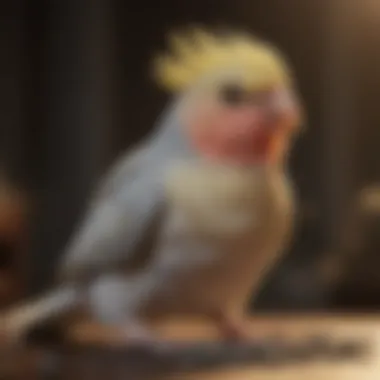
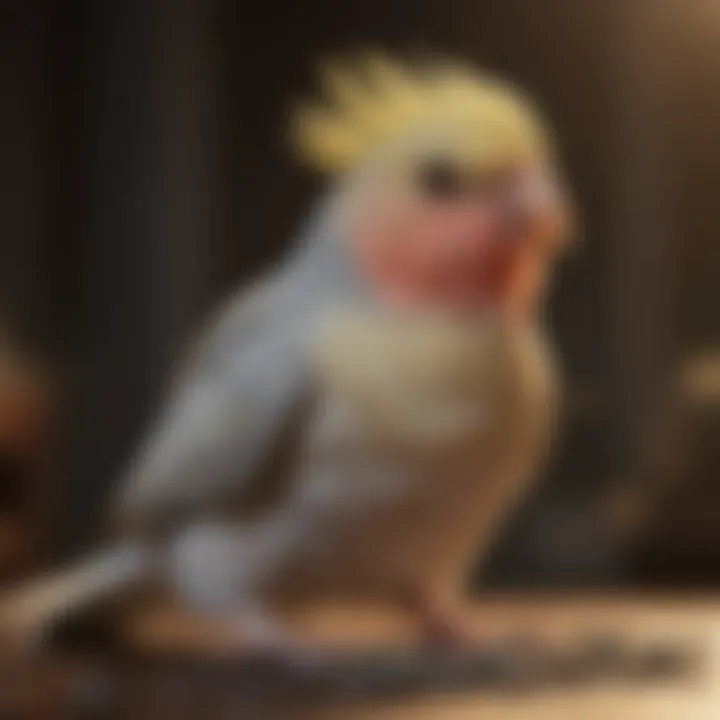
Essential Nutrients in Pellets
Proteins
Proteins are vital for the growth and maintenance of tissues in cockatiels. They play a key role in muscle development, feather production, and overall health. The primary source of protein in food pellets often comes from ingredients such as soybean meal or forage plants. Cockatiels require a diet high in digestible proteins to ensure they remain active and healthy.
The unique feature of proteins is their amino acid profile, which is necessary for numerous physiological processes. While animal-based proteins are more easily digested, plant-based proteins are also common in pellets. However, some cockatiels may not adequately digest certain types of plant proteins, which can lead to nutritional deficiencies.
Vitamins
Vitamins are crucial for maintaining various physiological functions. They support the immune system, facilitate metabolism, and promote healthy feather growth. Cockatiels require a mix of water-soluble and fat-soluble vitamins, typically found in high-quality food pellets.
One key characteristic of vitamins in pellets is that they are often synthetically added to ensure an adequate supply. This can be a benefit, as it helps in maintaining consistent nutrition. However, the stability of these vitamins can vary, affecting their availability for absorption by the birds. A lack of essential vitamins can lead to serious health issues, such as weakened immune response or deficiency diseases.
Minerals
Minerals are necessary for several bodily functions, including bone formation, nerve function, and enzyme activities. Common minerals found in cockatiel pellets include calcium, phosphorus, potassium, and magnesium. These minerals work in tandem with vitamins to provide a comprehensive nutrient profile.
The inclusion of minerals is highly beneficial. Calcium is particularly important for females, especially during breeding, to support eggshell formation. Nonetheless, excess minerals, especially calcium, can cause health problems if not balanced properly. An optimal diet should ensure that there is a safe proportion of minerals.
Reading the Nutritional Label
Reading the nutritional label on food pellets is a skill every cockatiel owner should develop. The label typically details ingredients, nutritional content, and feeding suggestions. One should prioritize products that list high-quality ingredients at the top. Look for a balance among proteins, vitamins, and minerals tailored specifically for cockatiels.
When examining the label, here are a few key points to consider:
- Ingredient List: Ensure it starts with specific ingredients rather than generic terms like "animal by-products."
- Guaranteed Analysis: This section shows the minimum and maximum nutrient levels, offering insight into the product’s quality.
- Expiration Date: Opt for fresh products to ensure nutrients are intact.
In summary, understanding the nutritional composition of pellets enables cockatiel owners to provide a balanced diet, which is essential for their birds' health and longevity. A careful look at the essential nutrients, along with informed label reading, leads to better dietary choices for the avian companions.
Benefits of Choosing Pellets
The choice of food pellets for cockatiels represents a significant point in avian nutrition. Pellets offer a well-rounded approach to feeding that can greatly improve the health and well-being of these birds. There are several benefits that come with adopting a pellet-based diet, which can lead to better overall health for cockatiels when compared to traditional seed diets. Key considerations include health advantages, convenience in feeding habits, and the ease of storage.
Health Benefits for Cockatiels
The foundation of choosing pellets lies mainly in the health benefits they provide. These include key factors such as weight management, reduced risk of obesity, and enhanced digestive health.
Weight Management
Weight management is crucial for the longevity and quality of life of cockatiels. Pellets are generally formulated to contain the right balance of nutrients, which helps maintain an ideal body weight. Unlike a seed-heavy diet, pellets do not promote excessive fat accumulation. This helps prevent potential health issues related to obesity such as heart disease or joint issues. The key characteristic of weight management through pellets is that they are calorie-controlled and nutrient-dense. This makes them a beneficial choice for cockatiels trying to maintain or lose weight. Switching to pellets can help cockatiels receive essential nutrients without excessive caloric intake.
Reduced Risk of Obesity
Following on from weight management, the reduced risk of obesity is an important aspect to consider. Obesity is a growing concern among companion birds, particularly with those who are primarily fed seeds. Seeds tend to be higher in fat and lower in essential nutrients, prompting cockatiels to overeat and gain weight. Pellets mitigate this risk by offering a balanced nutritional profile tailored specifically for cockatiels. A balanced diet can significantly lower the chance of developing health complications. The advantage of presenting a well-balanced pellet diet is the reduction of sugary or fatty seeds, which ultimately fosters a healthier lifestyle.
Enhanced Digestive Health
Enhanced digestive health is yet another reason pellets stand out in the feeding options for cockatiels. Pellets include ingredients formulated to support a cockatiel's digestive system. The fiber content is adjusted to maintain good gut health, reducing issues like diarrhea or constipation. Moreover, pellets are designed to provide a more consistent diet, which can minimize complications arising from sudden dietary changes. The significance of digestive health cannot be overstated, as it is integral to overall health and vitality. Pellets encourage a more holistic approach to feeding by presenting an easily digestible option compared to mixed seeds, which can often include harmful components.
Convenience and Storage
Beyond health benefits, pellets provide remarkable convenience and storage advantages. Pellets come pre-packaged and require less preparation compared to fresh fruits or seed mixes. Thus, feeding can become a simpler process. Moreover, pellets generally have a longer shelf life than seeds or fresh foods, reducing waste and spoilage. This convenience makes it easier for pet owners to maintain optimal feeding routines without frequent shopping trips for fresh produce.
In summary, adopting pellets as part of your cockatiel's diet provides numerous health benefits, encouraging weight control, reducing the risk of obesity, and enhancing digestive health. Additionally, their convenience in feeding and storage further solidify the value of integrating pellets into your cockatiel’s daily nutrition.
Transitioning to a Pellet-Based Diet
Transitioning your cockatiel to a pellet-based diet is an important step in ensuring optimal health and nutrition. Pellets are designed to provide a balanced diet, meeting the nutritional needs of cockatiels. Compared to seeds, which can often be high in fats and low in essential nutrients, pellets ensure that your bird receives necessary vitamins, minerals, and proteins. Therefore, making this switch can significantly enhance your pet’s well-being.
The process of transition, however, requires careful planning and execution. This is not just about replacing one food type with another; it is about understanding your cockatiel's eating habits and preferences. Knowing the steps and how to monitor your cockatiel's responses can help create a smoother transition, making it easier for both you and your pet.
Steps for a Successful Transition
- Gradual Introduction: Start by mixing a small amount of pellets with your bird's regular seeds. This helps your cockatiel become familiar with the new food without overwhelming it.
- Observation: Monitor your bird's eating habits closely. It is common for cockatiels to be hesitant at first; observe whether they are eating the pellets mixed with their seeds.
- Increasing Pellet Proportion: Gradually increase the amount of pellets while decreasing the seeds. This could take several weeks, so patience is essential.
- Varied Pellet Types: Consider offering different brands or types of pellets. Some birds may prefer certain flavors or textures, and this exploration can encourage acceptance.
- Remove Uneaten Seeds: After a few hours, remove leftover seeds to encourage your cockatiel to try the pellets. Ensure they do not have access to an unending supply of their preferred food source.
- Encouragement: Provide positive reinforcement through praise when your cockatiel tries new pellets. This promotes a positive association with the transition process.
Monitoring Your Cockatiel's Acceptance
Constant monitoring is essential during the transition. Watch for several signs of acceptance or rejection of the pellets. For instance, check their feeding behavior and note how much they are consuming.
- Acceptance Indicators:
- Rejection Indicators:
- Eating pellets consistently after a few days.
- Showing interest in exploring the pellets visually and by pecking.
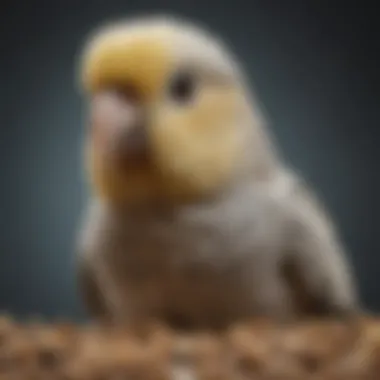
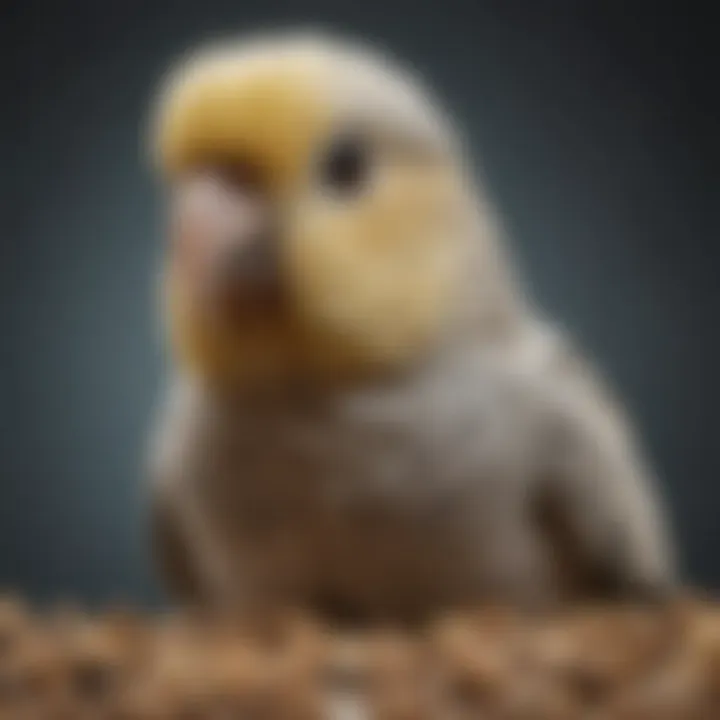
- Refusal to eat pellets after multiple attempts.
- Loss of weight or lethargy, which could indicate dietary issues.
If your cockatiel is not showing interest after a reasonable period, consider reverting to a mixed diet. You can try again later with different types or brands of pellets. Ultimately, the goal is to ensure that the transition is beneficial to the bird’s health rather than a source of stress.
As you practice these steps, patiently evaluate your cockatiel’s progress. Every bird is unique, and changes in their diet should be considered carefully to ensure they thrive.
Common Myths About Cockatiel Diet
Understanding the common myths surrounding cockatiel diets is essential for ensuring the health and well-being of these birds. Misconceptions can lead to improper feeding practices that could ultimately jeopardize their health. It is important for pet owners to recognize these false beliefs and make informed choices about their cockatiel’s diet. By debunking these myths, we can help ensure that cockatiels receive appropriate nutrition tailored to their needs.
Debunking Misconceptions
Many people believe that seed mixtures are the best diet for cockatiels. This assumption often stems from the fact that seeds are widely available and appear to be a natural food source for many birds. In reality, a diet consisting solely of seeds is not sufficient for cockatiels. Seed mixes often lack essential nutrients, and while seeds can provide some protein and fat, they may lead to deficiencies in vitamins and minerals. This can cause health issues such as feather plucking, obesity, and other serious conditions.
Another common misconception is that all pellets are the same. This is simply not true. There are various types, formulations, and qualities of pellets on the market. Some may contain fillers that do not contribute to a balanced diet. It is crucial for pet owners to be discerning about which pellets they choose by checking ingredient lists and nutritional values. Always opt for brands that prioritize high-quality ingredients without unnecessary additives.
The Reality of Seed-Only Diets
The belief that a seed-only diet can fulfill all nutritional needs is misleading. Cockatiels require a diverse diet to thrive. Seed-based diets alone lack vital nutrients that pellets are designed to address, such as essential vitamins like A, D3, and E. These vitamins play a critical role in maintaining avian health.
Furthermore, a diet that emphasizes seeds can lead to imbalances in fat and carbohydrate intake, potentially resulting in weight gain and other related health issues. Health experts consistently recommend incorporating pellets, along with fruits and vegetables, into the diet. These can provide a balanced approach to nutrition that is more in line with what cockatiels need for long-term health.
In summary, recognizing these common myths can empower pet owners to make better dietary choices for their cockatiels. Understanding the limitations of a seed-only diet and prioritizing high-quality pellets can significantly enhance the health of these birds.
Choosing the Right Pellets
Choosing the right pellets is crucial for the health and well-being of cockatiels. This decision can affect not just the nutrition but also the overall happiness of your pet. The variety of options available can be overwhelming. Therefore, understanding factors such as ingredient quality, brand reputation, and pricing can help pet owners make informed choices that benefit their cockatiels. A well-chosen pellet can ensure your cockatiel receives essential nutrients needed to thrive.
Factors to Consider
Ingredient Quality
Ingredient quality plays a significant role in the effectiveness of food pellets. High-quality ingredients contribute to the nutritional value of the pellets. It is essential to read the labels carefully. Look for whole grains and vegetables, as these provide necessary vitamins and minerals. Natural ingredients, without artificial additives, are usually a beneficial choice. They support a healthy digestive system and overall well-being. Selecting pellets with premium ingredients can reduce health issues in the long run.
Brand Reputation
Brand reputation is another important factor. Established brands often have a proven track record of quality. Consumers can trust brands that have positive reviews and recommendations from avian veterinarians. A well-known brand might also invest in better testing and quality control measures. On the other hand, lesser-known brands may not have the same commitment, leading to varying product quality. Making informed decisions about brand selection can significantly impact your cockatiel's diet.
Price
Price of pellets should also be considered. While many affordable options exist, lower prices may correlate with lower quality ingredients. However, more expensive does not always mean better. It's wise to compare the nutritional value in relation to cost. By analyzing the price, seek products that offer a balance of quality and affordability. This approach can help in maintaining good nutrition without overspending on feed.
Recommended Brands and Products
When selecting specific pellets for your cockatiel, several brands stand out due to their commitment to quality and nutrition. Brands such as Harrisons, Kaytee, and Zupreem are often recommended by avian specialists. Each of these brands offers various formulas tailored to cockatiels and other small birds. These options include novel ingredients and formulations designed to appeal to cockatiels' palates while providing essential nutrients.
In addition, it is beneficial to check online sources like reviews on Reddit or discussions in bird care forums. These platforms can provide insights from other pet owners who share their experiences. Be sure to consider the age, health, and preferences of your cockatiel when making a final selection. This ensures that the chosen food pellets meet their unique needs.
Addressing Common Concerns
Addressing common concerns regarding cockatiel food pellets is essential to ensure that pet owners make informed decisions. Many individuals have reservations about the nutritional aspects of pellets compared to traditional seeds. This section elucidates potential allergies, sensitivities, and the necessity of veterinary guidance, providing clarity and reassurance for concerned owners.
Potential Allergies and Sensitivities
Cockatiels can experience allergies or sensitivities to certain ingredients found in food pellets. Common allergens may include specific proteins, artificial additives, or fillers. Observing your cockatiel's behavior and physical health is crucial. If you notice symptoms like unusual itching, feather plucking, or gastrointestinal problems, it might indicate a food allergy.
To manage this, start by reviewing the ingredient list on the pellet packaging. Identifying known allergens can help you choose a suitable product. Opting for high-quality, natural brands often reduces the risk of reactions. Additionally, introducing new foods gradually allows for monitoring changes in your bird's health. Understanding your cockatiel’s unique needs is vital for optimal care.
When to Consult a Veterinarian
Consulting a veterinarian is a critical aspect of ensuring your cockatiel's wellbeing, especially when dietary issues arise. If your cockatiel shows persistent signs of distress or unusual behavior after switching to pellets, it is prudent to seek professional advice. Symptoms warranting a veterinary visit include:
- Loss of appetite
- Significant weight changes
- Diarrhea or abnormal droppings
- Lethargy or inactivity
A veterinarian can conduct a thorough examination and possibly recommend allergy testing if needed. They may advise dietary changes or specific pellet formulations that are better suited to your bird’s health requirements. Engaging with a veterinarian is not just about addressing concerns; it is about promoting long-term health.
"A proactive approach to your pet's health is always better than a reactive one."
By understanding the potential concerns associated with food pellets and recognizing when to seek professional help, cockatiel owners can create a healthier environment for their pets. This not only enhances the quality of life but also fosters a more trusting relationship between the pet and the owner.
Epilogues and Recommendations
The significance of food pellets in the diet of cockatiels cannot be overstated. This article has explored various aspects of their nutritional value, benefits, and the practicalities involved in transitioning your feathered friend to a pellet-based diet. Nutritional balance is crucial for the long-term health of your cockatiel, and pellets can play an essential role in achieving this balance.
Summarizing Key Points
- Nutritional Composition: Food pellets are formulated to provide essential nutrients that might be lacking in a seed-only diet. They typically contain an optimal balance of proteins, vitamins, and minerals necessary for your pet's well-being.
- Health Benefits: By incorporating pellets, you can effectively manage your cockatiel's weight, reduce the risk of obesity, and enhance digestive health. These benefits contribute to an overall improved quality of life.
- Convenience: Pellets are easier to store than fresh foods. They resist spoilage and make feeding more straightforward, allowing for flexibility in daily care routines.
- Transition Strategies: Transitioning to a pellet-based diet requires careful monitoring and patience. Understanding your cockatiel's preferences and slowly introducing pellets can foster acceptance, making the switch smoother.
- Myths Addressed: It is essential to dispel myths that perpetuate the idea of a seed-only diet. Knowledge of the realities behind such misconceptions can help pet owners make better choices for their feathered companions.
Encouraging Informed Choices
Pet owners are urged to make informed decisions when it comes to selecting the right food pellets. Here are a few considerations:
- Research the Brands: Understand which brands maintain high ingredient quality and transparency. It’s prudent to read reviews and compare options.
- Ingredient Inspection: Focus on pellets that list quality ingredients, avoiding those that contain excessive fillers or artificial preservatives.
- Consult with Professionals: When in doubt, always consult a veterinarian. They can provide tailored advice on your specific cockatiel's needs and any potential health concerns.
- Stay Updated: Knowledge in avian nutrition is always evolving. Engaging with communities, such as forums on Reddit (reddit.com), or abstract resources such as Wikipedia (en.wikipedia.org) and Britannica (britannica.com), can keep you informed.







